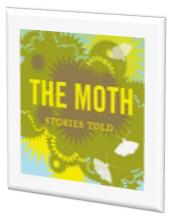In millions of Jewish homes tonight, the celebration of Passover will take place that tells the amazing story of the Children of Israel leaving Egypt and trekking to the Promised Land. It is a tradition that has occurred for thousands of years, and it reminded me of the power of a great story.
One of the biggest content revelations to many marketers and sellers over the past several years is about the return of storytelling. And given all the metrics we have – from real-time digital usage to Arbitron ratings that come out every week – it is interesting that a non-quantifiable form of communication is resonating so well with consumers.
And when it comes to retention and impact, there is also a benefit to a tale well told. That’s because rarely do you remember a chart, graph, or metric. But often you remember and are impacted by a great story.
This art form never went away, but an overreliance on numbers has all but obscured the power of a great story. It is ironic that in this age of ROI and big data, stories are more popular than ever. And as commercial radio grapples with the challenges of trying to stand out in an infotainment environment that is all about abundance rather than scarcity, it is surprising that more programmers, hosts, DJs, and personalities haven’t gone back to their storytelling basics, whether it’s on the air, in blogs or in videos where perhaps there’s more time and space to spin a great story.
 I was reminded of this a few weeks ago when StoryCorps received a $1 million MacArthur Award for Creative and Effective Institutions. If you’ve never heard it, StoryCorps launched in 2003, and has become a public radio hit featuring nearly 90,000 interviews with just plain folks. Created by David Isay, NPR carries these narratives, and they’re always available online.
I was reminded of this a few weeks ago when StoryCorps received a $1 million MacArthur Award for Creative and Effective Institutions. If you’ve never heard it, StoryCorps launched in 2003, and has become a public radio hit featuring nearly 90,000 interviews with just plain folks. Created by David Isay, NPR carries these narratives, and they’re always available online.
StoryCorps can be very powerful in shining the light on ordinary people, their lives, their troubles, their victories, and their points of view. While we often think about demographics in our media world, StoryCorps is a reminder of the power of the individual. By showcasing members of the armed services and their families, as well as those who have experienced illness and other life challenges, StoryCorps also brings home a reality that we often discuss in social media settings: every person counts. And in the case of StoryCorps, every person has an interesting compelling storyline to tell.
 And public radio has found that stories matter in other programming, too. “The Moth” is an amazing show that also specializes in storytelling. Started in 1997, it presents stories told live on stage in theater settings where the narrator shares personal and human experiences. It is riveting. And talk about extending “time spent listening?” If you’ve ever listened to The Moth, you’ve probably experienced that strange phenomenon of sitting in a car to hear the end of one of their amazing stories.
And public radio has found that stories matter in other programming, too. “The Moth” is an amazing show that also specializes in storytelling. Started in 1997, it presents stories told live on stage in theater settings where the narrator shares personal and human experiences. It is riveting. And talk about extending “time spent listening?” If you’ve ever listened to The Moth, you’ve probably experienced that strange phenomenon of sitting in a car to hear the end of one of their amazing stories.
And if you’ve watched “TED Talks” videos, you’ve witnessed some incredible standup storytelling moments where thought leaders, inventors, moms, and people from every walk of life teach us something new. A couple of weeks ago, we showcased one of these stories from the Dresden Dolls’ Amanda Palmer that many of you have seen and talked about. (Not surprisingly, one of NPR’s new shows repurposes these Ted Talks speeches in clever ways that make for great radio.)
There is clearly something going on here with storytelling – perhaps an inroad into appealing to younger consumers who may vividly remember being put to bed by a parent or grandparent telling them a great story. We see a programming trend worth noting, and we’re interested in your take on the topic.
Tomorrow, a look at how stories can be effective sales and marketing tools.
- Media And Technology In 2025: Believe It Or Not! - April 18, 2025
- In Radio, You Just Never Know - April 17, 2025
- The Secret To Making A Great Podcast (And Great Radio) - April 16, 2025




And then there was Jean Shepherd. Every night for 45 minutes on WOR in the 60’s and 2 hours on Saturday night from the Gaslight in the Village. How many people laid in bed at night, listening to the stories of Flick and Schwartz and went into radio because of the great stories. You are so right, Fred!
Thanks for the insights & the kind words, Carolyn. And best to your family for a great Seder.